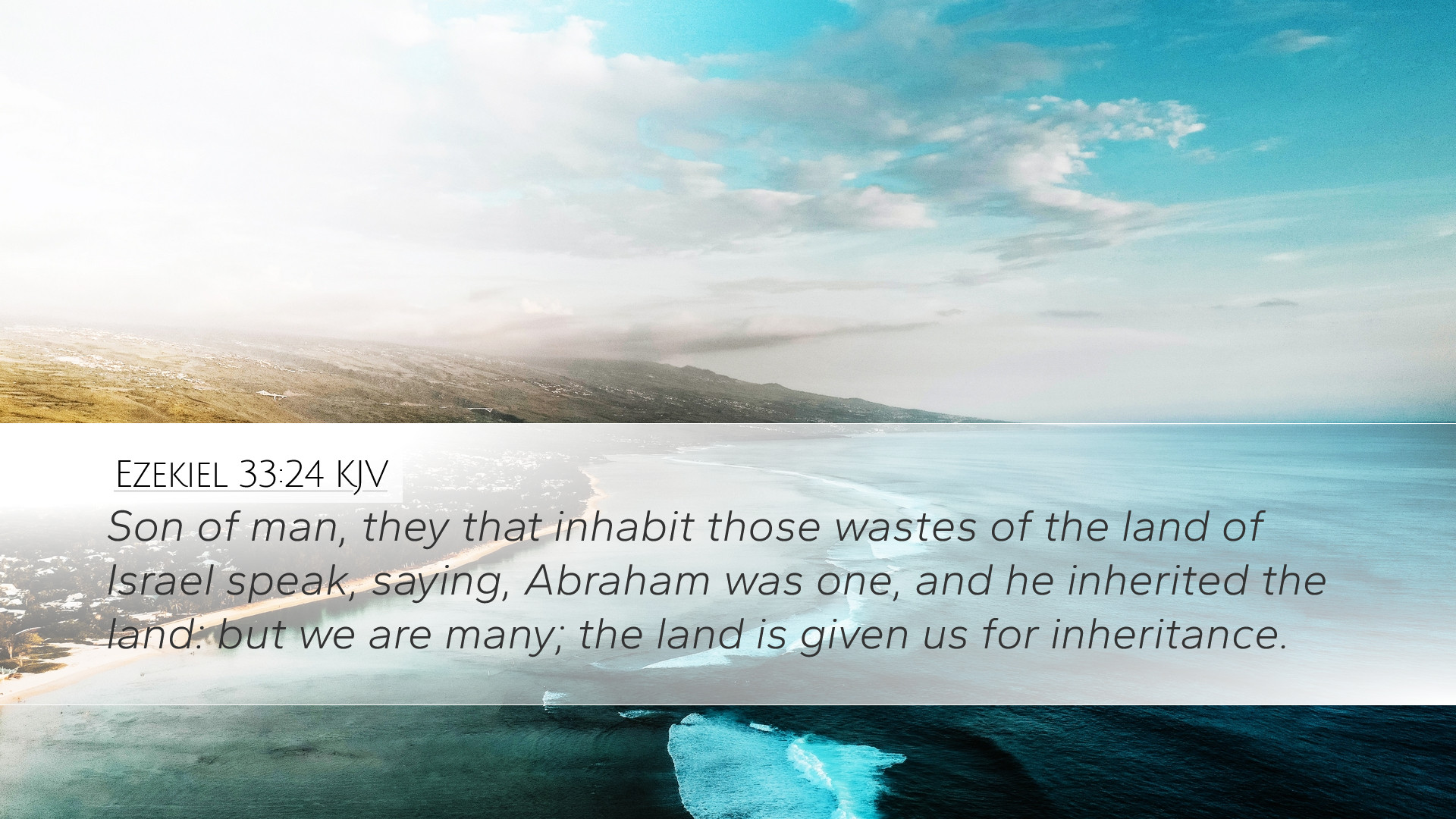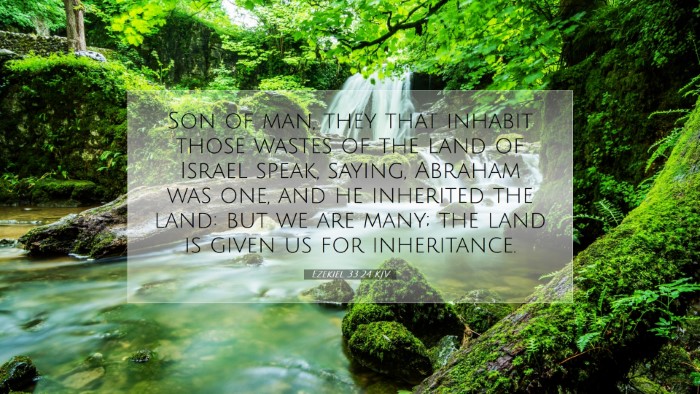Ezekiel 33:24 - Commentary and Insights
Ezekiel 33:24: "Son of man, they that inhabit those waste cities of Israel speak, saying, Abraham was one, and he inherited the land: but we are many; the land is given us for inheritance."
Contextual Background
This verse is set within the broader context of Ezekiel's prophetic ministry, where he addresses the exiles in Babylon concerning the fate of Jerusalem and the promises to Israel. The 'waste cities' refer to those that were desolated due to the Babylonian conquest, and the people’s claim reveals their misunderstanding of God’s covenantal promises. The reference to Abraham highlights their reliance on ancestral heritage rather than faithfulness to God.
Matthew Henry's Commentary
Matthew Henry shows that the people in these desolate cities were confident in their inheritance based on their lineage from Abraham. He points out that they misconstrue the promise made to Abraham, thinking that simply being descendants grants them entitlement to the land, irrespective of their behavior towards God's commands.
Henry emphasizes that they were deluded by their numbers and past privileges, believing that their existence as a larger group would outweigh God's judgment. This demonstrates a critical point: blessings can be forfeited through disobedience and sin. God’s promises come with conditions, and simply being part of the covenant community does not guarantee salvation or inheritance.
Albert Barnes' Commentary
Albert Barnes approaches this verse with a focus on the implications of the people's assertions. He notes that their reliance on Abraham, their father, reflects a widespread attitude within Israel that personal and national history could excuse their current disobedience. The presumption of divine favor based solely on heritage is a significant theme in Scripture and is often corrected by the prophets.
Barnes articulates that for the exiled Israelites, who believed the promised land was theirs by right, Ezekiel’s prophetic voice is a critical reminder that present conduct affects one's standing before God. He urges the people to ruminate on their actions and to understand that their forefather's faith must be matched by their own. Barnes argues that this message transcends antiquity; it calls contemporary believers to a personal and accountable faith.
Adam Clarke's Commentary
Adam Clarke offers insights into the historical and theological context of the passage. He asserts that the expression "Abraham was one" encapsulates a profound acknowledgment of the unique covenantal relationship that God established with Abraham. However, he critiques the notion that mere lineage provides security in God’s land. Clarke explicates that the people's pride in their numerical advantage, juxtaposed with Abraham's singular legacy, reflects an underestimation of divine justice.
Clarke warns that this attitude resulted in a forgetting of their spiritual responsibilities. He highlights the necessity for personal holiness and obedience, noting that God’s covenants are not merely about heritage but about active participation in a relationship with Him. The onus is on the current generations to uphold their part in the covenant or face judgment.
Theological Reflections
The theme that emerges from Ezekiel 33:24 is one of covenant responsibility. While Abraham's legacy is foundational to Israel’s identity, the faithfulness of subsequent generations is crucial. The Jewish people often took pride in their ancestry and felt assured of their right to the land, yet the prophets consistently challenged them to reflect their faith through their actions.
This passage serves as a poignant reminder for modern believers as well. Confidence in one's Christian heritage, church attendance, or familial background cannot replace a genuine faith that produces obedience. God’s grace must not be presumed upon or taken for granted as mere privilege; rather, it demands an active response in living accordance with His will.
Practical Applications
- Personal Accountability: Every believer should scrutinize their faith and practice. Individuals cannot rely on family faith but must cultivate their relationship with God.
- Understanding Covenant Promises: It is essential to comprehend the conditions that come with God’s promises. They are often contingent upon obedience and faithful living.
- Community Responsibility: Just as the exiles needed to recognize collective sin, the modern church must acknowledge and repent for shared failures to uphold God’s standards.
- Active Faith: Genuine faith is evidenced by actions. Believers today are encouraged to reflect upon their lifestyle and ensure it aligns with the teachings of Scripture.
Conclusion
Ezekiel 33:24 serves as a significant reminder of the depth of God’s call to His people. Through the reflections of various scholars, it becomes evident that heritage does not exempt one from the necessity of personal righteousness and accountability. The passage urges an active, engaged faith that recognizes that God’s promises, while generous, are accompanied by the challenge of living in obedience to His word.


